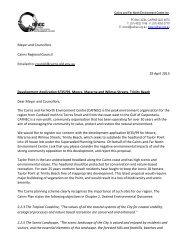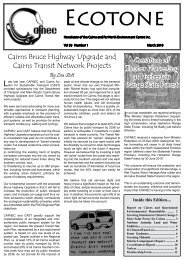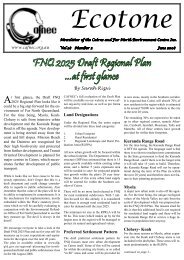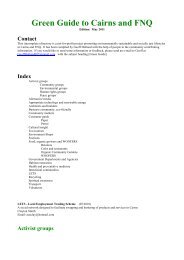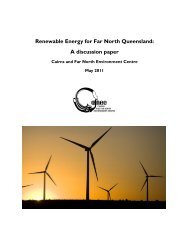Ecotone Vol32 No4 - CAFNEC
Ecotone Vol32 No4 - CAFNEC
Ecotone Vol32 No4 - CAFNEC
You also want an ePaper? Increase the reach of your titles
YUMPU automatically turns print PDFs into web optimized ePapers that Google loves.
CREATING A PLASTIC-<br />
FREE PARADISE<br />
BY ANNA MCGUIRE<br />
<strong>CAFNEC</strong> recently kicked<br />
off the Think Outside<br />
the Bag campaign, to<br />
encourage a phase-out of<br />
plastic bags in a couple<br />
of trial areas in the far<br />
north. One of these<br />
areas is Port Douglas,<br />
where we’re excited<br />
to be working with<br />
the Douglas Shire<br />
Sustainability Group<br />
and Tangaroa Blue.<br />
Think Outside the Bag<br />
is about encouraging<br />
shoppers and businesses to<br />
shift away from a disposable bag culture<br />
and towards reusable bags. This transition makes a<br />
lot of sense both economically and environmentally,<br />
particularly as our local economy relies on nature<br />
based tourism.<br />
Our work so far has focussed on finding creative<br />
ways to communicate our message and encourage<br />
community participation in the project.<br />
Recently in Port Douglas we ran a competition for<br />
local residents to design an image for a Port Douglas<br />
reusable shopping bag. Congratulations to competition<br />
winner, Jenni Fox, who created a beautiful underwater<br />
design. Keep an eye out for these bags which will be<br />
printed and ready to go early in the new year.<br />
Local Cairns artist Kevin Mayo has kindly helped out<br />
with the project and created an impressive window<br />
display at Community Foods cooperative in Cairns. It’s<br />
a glowing and intriguing world of plastic, so stop by<br />
the shop at 74 Shields St and have a look if you haven’t<br />
already.<br />
As part of this project we’re also pushing for a statewide<br />
ban on single-use disposable plastic shopping<br />
bags. You can join the growing number of people<br />
supporting this idea by signing our petition at www.<br />
cafnec.org.au.<br />
A bit about bags….<br />
If you think it’s not your plastic bags ending up in the<br />
oceans, think again: our plastic bags can ‘escape’ from<br />
bins, waste trucks and landfill sites and end up in our<br />
rivers and oceans via stormwater drains. So each plastic<br />
shopping bag that we use might just end up in a sea<br />
turtle’s stomach.<br />
Confused by ‘degradable’ versus ‘biodegradable’<br />
The ‘degradable’ plastic bags·<br />
that are commonly used in supermarkets<br />
are still made from petrochemicals and<br />
are not necessarily any better for the<br />
environment. These bags have an additive<br />
that makes them break apart more quickly<br />
when exposed to direct sunlight or heat.<br />
They do not biodegrade, but instead break<br />
apart into smaller and smaller plastic pieces<br />
which accumulate in the environment<br />
‘Biodegradable’ bags are not·<br />
made of petrochemicals, but are instead<br />
made of plant starch, often corn. These<br />
bags biodegrade, meaning that they break<br />
down into natural elements like carbon and<br />
water. They can still pose a threat to marine<br />
life if they end up in the sea, but are a better<br />
option than regular plastic bags.<br />
Where do plastic bags go for recycling<br />
You can take your plastic bags to major supermarkets<br />
for recycling. From there they are transported to<br />
Brisbane, then overseas (usually to China) for recycling<br />
into low grade plastic items. Recycling your plastic bags<br />
is better than putting them in the bin, but beware: the<br />
process is not as environmentally friendly as you might<br />
think — it involves a lot of energy, emissions, heat, and<br />
chemicals, and the end product is always of poorer<br />
quality than the original material.<br />
So what’s the solution<br />
The best choice is to take your own reusable bag<br />
when you go shopping. Using a reusable bag of any<br />
description is environmentally better than using<br />
disposable plastic bags. Natural fibre reusable bags<br />
(such as cotton or bamboo) are the best option.<br />
Take action!<br />
Sign our petition to make Queensland plastic bag<br />
free! South Australia, the Northern Territory and<br />
the ACT have already banned single use disposable<br />
plastic shopping bags and we can too.<br />
Help us put Queensland on the map – sign the<br />
petition at www.cafnec.org.au<br />
Why go bag free<br />
The average plastic bag is used·<br />
for about 12 minutes but takes up to 1,000<br />
years to break down<br />
Plastic kills 1 million sea birds·<br />
and 100,000 sea mammals each year<br />
Australians use over 4 billion·<br />
plastic bags each year, most of these ending<br />
up in landfill, contributing to growing waste<br />
disposal problems.<br />
But it’s not my plastic bags choking turtles!<br />
16



